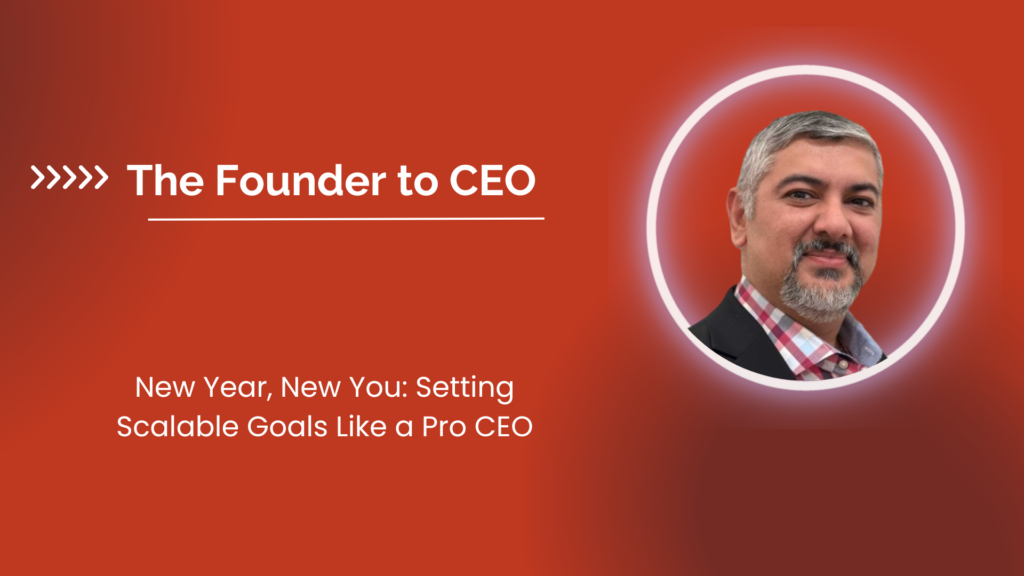Are S.M.A.R.T. goals stupid?
No, but they may not be the best model for a scaling CEO.
Why?
Ever set a goal that felt brilliant in January but irrelevant by March? Ouch!
That’s the trap of traditional SMART goals—they focus on ticking boxes instead of building momentum. CEOs don’t just aim for good—they aim for scalable. They don’t chase goals; they engineer outcomes.
As we start the new year, ditch the SMART goal hamster wheel. Let’s unlock the mindset and strategy to set CEO-level OKRs (Objectives and Key Results) that make your business unstoppable. Here’s the roadmap.
Step 1: Start with the Vision, Not the Checklist
SMART goals love clarity, but they often miss the forest for the trees. A pro CEO zooms out before zooming in.
Ask yourself:
- What does success feel like for my business in 3-5 years?
- What will this year need to look like to make that vision inevitable?
Imagine your business as a rocket. The vision is your destination (Mars, perhaps? Oh wait, that one has been taken), while goals are the trajectory adjustments that get you there. Before you dive into metrics, nail down a vivid, inspiring vision that excites you—and your team.
Pro Tip: Write down your “North Star” in one sentence: “In three years, we will be the go-to marketplace for [specific audience] to achieve [specific outcome].”
Remember the famous part of Kennedy’s speech: “We choose to go to the moon in this decade…” He made that speech in 1962. Not this century. This “decade”. Maybe another term for this would be BHAG (Big Hairy Audacious Goal). This is your North Star.
My favorite part of setting a North Star is it streamlines what you will say “No” to.
Step 2: Set Bold Objectives That Spark Intrigue
SMART goals love safe bets. CEOs aim for “bold but believable.” That’s where OKRs shine:
- Objective: A big, inspiring goal that energizes the team.
- Key Results: Specific, measurable outcomes proving you’re making progress.
Example:
Objective: Double our customer base while maintaining stellar service.
Key Results:
- Sign 100 new customers by Q3.
- Increase NPS (Net Promoter Score) from 70 to 85.
- Reduce churn from 10% to 5% within six months.
Notice the balance? The objective makes you feel like a winner. The key results break down what winning looks like, step by step. Another way I like to look at it is that the Objective is qualitative and the Key Results are quantitative.
Step 3: Align OKRs with the Big Three: Revenue, Team, and Operations
Goals that don’t align with your core business drivers are distractions. CEO-level OKRs always tie back to the trifecta:
- Revenue: What will move the needle financially?
- Team: How will you empower your people to perform?
- Operations: What processes need to scale to support growth?
Example Breakdown:
- Revenue Objective: Launch a new product to increase revenue by 30%.
- Team Objective: Build a high-performing sales team.
- Operations Objective: Automate customer support to handle growth.
Step 4: Track Ruthlessly, Adjust Strategically
Here’s the CEO secret sauce: treat your goals like living, breathing entities. If a key result isn’t moving the needle, don’t panic—pivot.
Action Steps:
- Review OKRs every month. What’s on track? What’s lagging?
- Hold yourself (and your team) accountable with clear deadlines.
- Adjust key results if market conditions or priorities shift—but never the objective.
Remember, progress beats perfection. CEOs thrive because they adapt. We will get to Mars, eventually.
Step 5: Use Metrics to Drive Motivation, Not Burnout
Metrics can empower—or demoralize. The difference is how you frame them. If your team feels like they’re chasing impossible numbers, you’ve lost the game.
Instead, celebrate wins along the way:
- Weekly updates that highlight progress.
- Shoutouts for team members crushing their key results.
- Quarterly reflection sessions to revisit the “why” behind each objective.
The OKRs are owned by everyone though different team members may deliver different key results. At any point, anyone on the team should know the company OKRs.
When your team believes the mission matters, they’ll push harder—and smarter.
Your Challenge: Think Bigger, Act Bolder
SMART goals are a relic of incremental thinking. CEOs think exponentially. This year, swap the comfort of “doable” goals for the adrenaline of bold, measurable OKRs that demand your best.
Reflection Exercise: What’s one objective that scares you—but could transform your business? Write it down. Flesh out 2-3 key results that prove progress. Then, ask yourself: “Am I ready to lead this charge?”
Scalable success starts with a scalable mindset. What’s your first bold move?
Let me know—I’d love to hear your vision for 2025.


